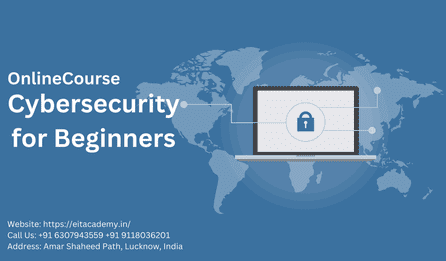Introduction to Cybersecurity for Beginners with Certificates in 2024-25.
Introduction to Cybersecurity for Beginners with Certificates in 2024-25.
Cybersecurity for Beginners in India 2024-25
Cybersecurity for beginners is an essential area of learning, especially in countries like India where the digital world is quickly increasing. As more Indians use technology for everyday activities such as online banking and social networking, the risks connected with cyber threats increase.
Cybersecurity safeguards systems, sensitive data, online privacy, and computer integrity. Its mission is to defend and protect against all threats, regardless of the type of the person, group, or computer being targeted. Everyone should learn about cyber security so that they are more alert and knowledgeable about how to behave safely and responsibly online.
As India continues to embrace the digital revolution, cybersecurity for beginners will become an essential skill. It enables citizens to safely navigate the internet, defends national interests, and contributes to a secure digital future for the country.
Why should you pursue a course in Cybersecurity for Beginners
1. Growing
Demand:
One
of the professions with the fastest rate of growth in the world right now is cybersecurity.
Cyber security experts and professionals are always needed to handle threats
and attacks in order to defend and safeguard our online and network security
because of the continuously rising number of crimes. The world of cyberspace is
always expanding and evolving, opening up new avenues for criminal actors as
well as for security.
2. Protect
Personal Information:
Cyber
risks are present in everyday activities like social media use, online
shopping, and remote work. Knowing cybersecurity helps safeguard your money and
personal data.
What Will You Learn in a Beginner Cybersecurity Course?
The fundamentals of safeguarding digital systems and data are covered in a cybersecurity for beginner course. Important topics include the CIA triad (Confidentiality, Integrity, Availability), common cyberthreats (phishing, malware, ransomware), and secure networking principles like firewalls, encryption, and protocols like HTTP and TCP/IP. In addition to exploring tools like antivirus software, SIEM systems, and ethical hacking frameworks, students also learn how to recognize vulnerabilities and comprehend secure coding methods. In addition to covering legal and compliance subjects like GDPR and cybersecurity ethics, hands-on labs use virtual environments to simulate threat detection and response. The course gives students the fundamental skills they need for the area by frequently highlighting career routes, certifications like CompTIA Security+, and positions like ethical hacker or SOC analyst.
Types of Cyber Threats
- Virus: It is a type of malware that replicates and spreads by injecting copies of itself into other executable files or documents.
- Hacking Websites: Unauthorized access to any website in a personal or professional space.
- Malicious Codes: It is a type of security danger in which any code existing in software has the potential to cause harm, compromise the system's security, or damage the system.
- Identity Theft and Phishing: It is a cyber attack that uses bogus emails appearing as authorized entities to trick users into disclosing personal and professional information.
- Cyber Warfare: Deliberate attacks on information systems using computer technology to disrupt state activity, particularly for military goals.
Taking a cybersecurity for beginner course gives you the tools to safeguard digital assets in a world that is becoming more linked, which can lead to a successful and in-demand job. In addition to learning how to use technologies like firewalls, SIEM systems, and ethical hacking frameworks, you also acquire practical knowledge in spotting and thwarting cyberthreats, secure coding techniques, and adherence to regulations like GDPR and HIPAA. Through simulated labs, a course provides practical experience that improves problem-solving skills and gets you ready for certifications like CompTIA Security+ or CEH. It offers the know-how to protect enterprises, guaranteeing job security and professional development in a crucial, rapidly changing industry, whether you're just starting out in your career or upgrading your skills.
What is Cybersecurity?
Cybersecurity, to put it simply, is the protection of internet-connected devices, systems, and networks from malevolent actors like hackers and cybercriminals. The primary goal of cybersecurity is asset protection. Some elements, nevertheless, concentrate on attacking first.
- CompTIA Security+: A popular entry-level certification that covers fundamental security topics such as network security, cryptography, and identity management.
- Certified Ethical Hacker (CEH): This course teaches you how to think like a hacker and how to protect systems from cyber-attack.
- Cisco Certified CyberOps Associate: An ideal for those interested in cybersecurity operations and network security.






Comments
Post a Comment